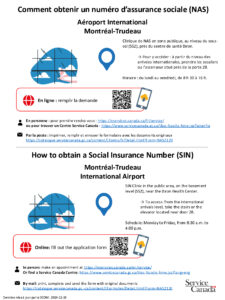Text : Francisco Salazar
Filing your taxes may seem complicated, but with the right information and necessary documents, you can take care of this obligation with ease. Take the time to get informed and reach out by phone or WhatsApp to UPA Montérégie, an organization that provides free tax-related assistance. You can also seek guidance from an organization in your area that is a member of the Migrant Workers Support (MWS) program.
Remember, the deadline to submit your annual tax return is usually April 30, covering the period from January 1 to December 31 of the previous year. Your tax return can be filed online for a fast and secure submission or sent by mail to the Canada Revenue Agency (CRA) and Revenu Québec (RQ)
Yes, TFW must file a tax return
Anyone earning income from a Canadian-based employer is required to comply with Canadian tax laws. This includes temporary foreign workers (TFWs), who must file a tax return. Below is a guide to help you understand the key steps and ensure everything is in order when submitting your return.
1. Determine your tax residency status
Your tax status depends on the length of your stay and the ties you have established in Canada. If you are a tax resident, you must report all income, including income earned in your home country. This status applies to those who have stayed in Canada for 183 days or more in a calendar year. If you are a non-resident, you only report income earned in Canada. This applies to those who have spent 182 days or less in Canada during the year.
2. Make sure you have a tax identification number
To work and file taxes in Canada, you must have either a Temporary Identification Number (TIN) or a Social Insurance Number (SIN) The SIN is a unique 9-digit number required for employment, access to government programs, and essential for filing taxes. It is assigned to only one person and must remain confidential.
3. Gather the necessary documents
Ensure you have the following documents for your tax return. T4 slip (Statement of Remuneration Paid). Summarizes your income and deductions made by your employer, such as taxes, Employment Insurance (EI), and pension contributions. Relevé 1 slip indicates earnings and deductions specific to Québec.
Check with your accountant, as additional documents may be required to complete your tax return accurately.
- T4E Details parental benefits received.
- T4A(P) or NR4 Reflects pension benefits received.
- T5007/R5 Covers workplace injury compensation from the CNESST (Commission des normes, de l’équité, de la santé et de la sécurité du travail).
- T4A Used for various incomes, such as language training scholarships or disability insurance benefits.
- COWAN insurance benefits. If you have COWAN insurance, include a note stating the total amount of insurance premiums paid, as they may be deductible.
- RRSP slip. Indicates contributions made to a Registered Retirement Savings Plan (RRSP) during the year.
4. Take advantage of tax deductions and credits
You may be eligible for various tax deductions and credits, including Québec Pension Plan (QPP) contributions, GST/HST tax credit, child tax benefits and medical expense deductions.
Medical expense credits also apply to TFWs. Eligible expenses include receipts from dentists, orthodontists, optometrists, doctors, and prescription drugs. Keep in mind that some tax credits are only available for tax residents consult an accountant to maximize your benefits.
5. Payroll deductions
Your employer automatically withholds amounts from your paycheck to cover: Federal and provincial income taxes, Employment Insurance (EI) premiums, Québec Pension Plan (QPP) contributions. Keep copies of all your slips, receipts, and tax forms—they may be required if your tax return is audited.
6. Tax refunds
If the taxes withheld from your paycheck were higher than what you owe, you may be eligible for a refund after filing your return. To get your refund faster, sign up for direct deposit—it’s the quickest way to receive your payment.
Plan and maximize your refund. Proper organization and smart tax planning can help reduce stress during tax season. Start as early as possible, and don’t hesitate to consult a professional to ensure you don’t miss any deductions. By following these steps, you can reduce your tax burden, optimize your financial situation, and make your tax return process smoother and hassle-free.






